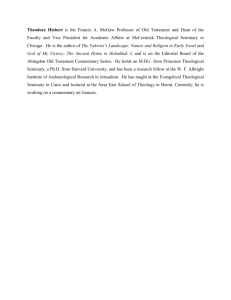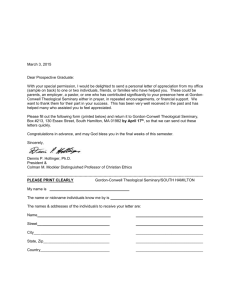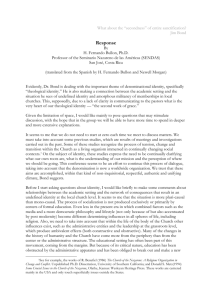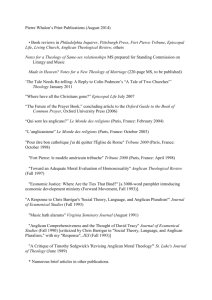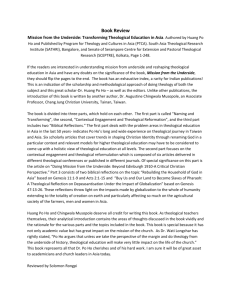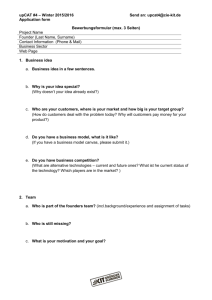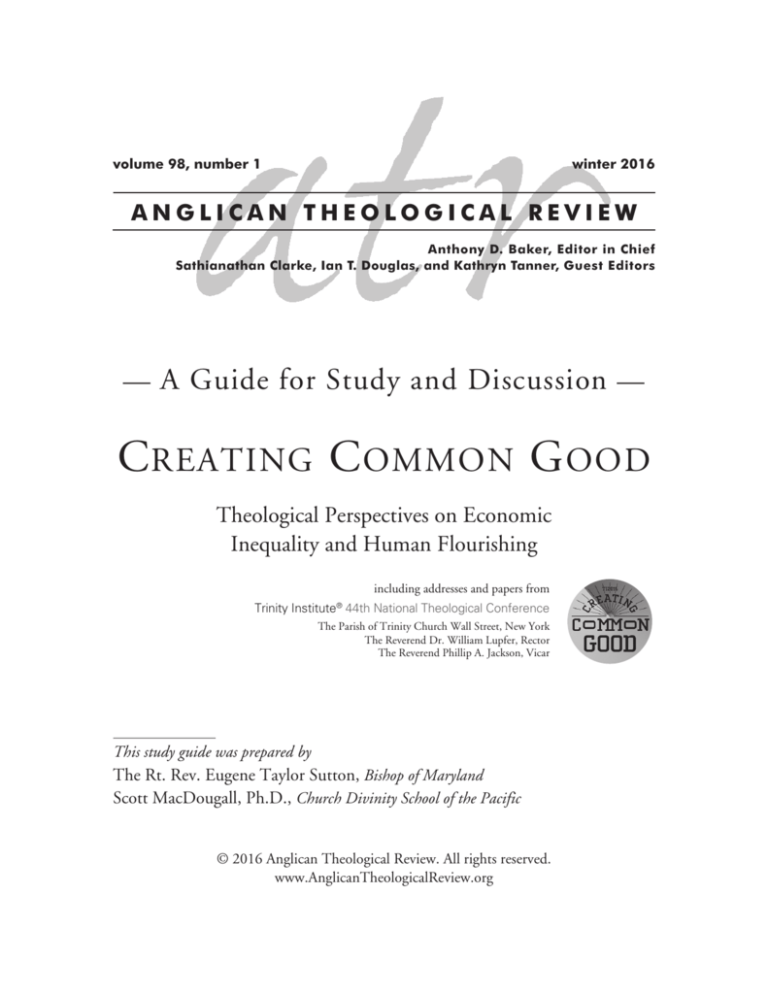
volume 98, number 1
winter 2016
ANGLICAN THEOLOGICAL REVIEW
Anthony D. Baker, Editor in Chief
Sathianathan Clarke, Ian T. Douglas, and Kathryn Tanner, Guest Editors
— A Guide for Study and Discussion —
C REATING C OMMON G OOD
Theological Perspectives on Economic
Inequality and Human Flourishing
including addresses and papers from
®
Trinity Institute 44th National Theological Conference
The Parish of Trinity Church Wall Street, New York
The Reverend Dr. William Lupfer, Rector
The Reverend Phillip A. Jackson, Vicar
This study guide was prepared by
The Rt. Rev. Eugene Taylor Sutton, Bishop of Maryland
Scott MacDougall, Ph.D., Church Divinity School of the Pacific
© 2016 Anglican Theological Review. All rights reserved.
www.AnglicanTheologicalReview.org
Creating Common Good: A Guide for Study and Discussion
D OES I NEQUALITY R EALLY M ATTER ?
JUSTIN WELBY
Summary
The Archbishop of Canterbury reminds us that although personal wealth can justifiably be
seen as a sign of God’s blessing, widespread social inequality is politically unsustainable,
biblically unsupportable, and theologically bankrupt.
Questions for Discussion
1. In his address Archbishop Welby notes that “there is a biblical injunction against the systematic and indefinite accumulation of grossly unequal societies. It always leads to abuse, even
if every wealthy person is generous, because the asymmetries of power mean that wealth allocation becomes a matter of paternalism, not a basic issue of justice” (p. 12). Do you agree with
this statement? How would you characterize the Bible’s stance on inequality and injustice?
2. In his reference to the equality inherent in the Adam and Eve story, Archbishop Welby observes that “hierarchy is deeply embedded” in human existence (p. 8). In the Anglican tradition,
the liturgies for ordination in The Book of Common Prayer admonish the newly ordained to
take a special concern for “the poor.” How do the hierarchical structures of the church both
support or challenge the inequalities of society?
3. How are the resources and wealth of your congregation used to reduce inequality in your
community and in the world?
Anglican Theological Review / Winter 2016
page 2
Creating Common Good: A Guide for Study and Discussion
C LASS M ATTERS
BARBARA EHRENREICH
Summary
Barbara Ehrenreich believes that most people do not understand the humiliating circumstances
which keep people in poverty. The poor are not poor because of bad choices they may have
made; they are poor because the system keeps them poor.
Questions for Discussion
1. How aware is your congregation of the causes of poverty in your surrounding community?
Is there “hidden” poverty that is not readily evident?
2. Read the parable of the Good Samaritan in Luke 10:25–37, where Jesus defined a “neighbor”
as the one with whom we do not have much in common. A first step in following our Lord,
then, is to get to know those who are our neighbors. Who is your “neighbor” in your community or city? Does your church know any of its neighbors?
3. How are the poor viewed in your congregation and community—with compassion or with
contempt?
Anglican Theological Review / Winter 2016
page 3
Creating Common Good: A Guide for Study and Discussion
W HAT C AN W E D O
ABOUT
E CONOMIC I NEQUALITY ?
JULIET B. SCHOR
Summary
Juliet Schor argues that inequality, with few exceptions, is the natural result of traditional capitalist economies, benefiting mostly a few but suffered by most people in the world. What is
needed are new and innovative market approaches that are based on cooperation rather than
competition.
Questions for Discussion
1. Professor Schor maintains that “the structures and institutions that dominated in the nineteenth century—private property, the motivation of financial interest—are no longer those
that yield efficient and socially beneficial outcomes” (p. 30). Do you agree? What evidence
could support your view?
2. Does Christianity favor one economic system over another? How does the Bible view the
proper role of faith—if any—in determining our common economic life?
3. Can your congregation play a role in initiating or nurturing any of the innovative efforts
that the author names as fair and sustainable in this article?
Anglican Theological Review / Winter 2016
page 4
Creating Common Good: A Guide for Study and Discussion
I S P LUTOCRACY S INFUL ?
WILLIS JENKINS
Summary
Willis Jenkins contends that publicly assigning the theological category of “sin” to the reality
of vast disparities in wealth may be less productive for actually ameliorating that condition
than engaging in concrete acts of resistance against that supposedly “natural” economic order.
Practicing an alternative economic regime, even in small and local ways, can expose the true
sinfulness of plutocracy and the slate of nested inequalities to which it leads more directly,
compellingly, and effectively than belief-based arguments have demonstrated an ability to do.
Questions for Discussion
1. Professor Jenkins is careful to point out that sin-language can be applied helpfully to plutocracy, but most likely only under specific circumstances and for specific people. What are
those circumstances and who are those people? How does this relate to the overall “tactic” of
his position?
2. How does the author understand the relationship between beliefs and practices? Why does
he think that addressing inequality at the level of belief may be less effective than resisting it as
a concrete practice? How do you assess this perspective?
3. On page 43, Jenkins discusses a set of economic practices that he judges to be good practices
but that he thinks are not sufficient as a Christian economic ethic on their own. What is the
basis of his concern? How does it emerge from his view of economic systems and practices as
spiritualities? What is your evaluation of this caution?
Anglican Theological Review / Winter 2016
page 5
Creating Common Good: A Guide for Study and Discussion
T HE S PIRIT AND THE S UBPRIME :
R ACE , R ISK , AND O UR C OMMON D ISPOSSESSION
AMARYAH JONES-ARMSTRONG
Summary
Following Willie James Jennings’s influential account of how a particular imagination of
Christianity gave rise to American ideas of race, this essay employs Sarah Coakley’s method of
théologie totale to carry out a critical and contemplative “pneumatological dispossession,”
exposing and dismantling Christian complicity in creating a view of the common good from
which many black Americans are largely barred, explicitly or functionally. Amaryah JonesArmstrong then suggests practical actions that Christian communities might take to enact a
revised theological imagination, one with a larger notion of the common good and a reconceived
view of who properly has access to it.
Questions for Discussion
1. How does Amaryah Jones-Armstrong connect Jennings’s perspective on the theological underpinnings of American constructions of race to the socio-political (including financial) realities
of the black Americans she refers to as “the subprime”?
2. Why does Jones-Armstrong put Jennings’s perspective into conversation with Coakley’s
method? What do these two theologians each provide that, taken together, advance her project?
3. The author quotes from Sarah Coakley: “The very act of contemplation—repeated, lived,
embodied, suffered—is an act that, by grace, and over time, inculcates mental patterns of ‘unmastery’” (p. 63). What do you think Coakley means by this? What role does it play in JonesArmstrong’s overall argument? In addition to those drawn out by Jones-Armstrong herself,
what ecclesial implications might employing Coakley’s method have for reconceiving the common good and practically manifesting that reconception?
Anglican Theological Review / Winter 2016
page 6
Creating Common Good: A Guide for Study and Discussion
S OTERIOLOGY , D EBT , AND F AITHFUL W ITNESS :
F OUR T HESES FOR A P OLITICAL T HEOLOGY
OF E CONOMIC D EMOCRACY
LUKE BRETHERTON
Summary
By way of articulating and defending four interrelated theses, Luke Bretherton offers a theopolitical framework for questioning both neoliberalism and democratic socialism as our only
options for our politics and economics. His framework is based in part on a theological understanding of salvation as God’s liberation of humanity and all of creation from “debt slavery,”
in an expansive sense. Churches have a crucial role to play in this, as a site where corporate
modes of enacting the biblical value of koinonia (fellowship) are able to contribute to the
creation of a truly democratic and life-giving oikonomia (economy) that is consistent with the
divine desire for the flourishing of the whole world.
Questions for Discussion
1. The support that Professor Bretherton offers for each of his four theses relies, to varying extents, upon his conviction that “talk of God will always have a complex relationship of resonance, resistance, and reconfiguration with talk of economics” (p. 76). How does his essay
support this position? How do you evaluate it theologically?
2. What does the author mean by “debt slavery”? How and why does he address this understanding of “debt” by outlining a theology of salvation?
3. In what sense does Professor Bretherton think that how we shape Christian community and
live within it can affect how the common good is perceived, pursued, and procured? Are there
specific actions your church or community has taken or could take that might exemplify this
idea?
Anglican Theological Review / Winter 2016
page 7
Creating Common Good: A Guide for Study and Discussion
C LOSING THE G AP :
A S OCIAL I MAGINARY
FOR THE
C OMMON G OOD
SCOTT BADER-SAYE
Summary
Scott Bader-Saye presents philosopher Charles Taylor’s idea of the social imaginary to argue
that the way in which we currently view, relate to, and use money is embedded in certain narratives, policies, and practices that, far from being inevitable, can and must be questioned and
either modified or replaced. This effort is especially crucial, he claims, for communities of
faith, because their robust resources for thinking in holistic terms about the common good position them well to offer workable alternatives for reducing our record-high levels of global inequality.
Questions for Discussion
1. According to Professor Bader-Saye, what is the difference between homo economicus and the
vision of the human person offered by the Christian theological tradition? How would you
question, nuance, or further elaborate this distinction?
2. How does the author think that our current social imaginary has lost sight of limits? What
has been the cost of this? What theological resources does he bring to bear as a corrective? Can
you offer additional examples of how limits are often disregarded, assessing their costs and suggesting theological and concrete responses?
3. Values (of all sorts) and how things are valued (economically and theologically) play a central
role in Professor Bader-Saye’s essay. How does this theme relate to his overall effort? Are there
additional values or methods of valuation that you would add? How would you connect them
to the revision of our social imaginary?
Anglican Theological Review / Winter 2016
page 8
Creating Common Good: A Guide for Study and Discussion
T HE S TRUGGLE FOR H UMAN D IGNITY
IN A C ONSUMER -O RIENTED C ULTURE
BEVERLY EILEEN MITCHELL
Summary
In our work to reduce the negative effects of inequality, Beverly Mitchell contends, we must
avoid reproducing the same conditions that have given rise to inequality in the first place. We
must safeguard the inherent value of human lives, the disvaluing of which has been at the root
of economic disparity, by honestly addressing our own biases against the economically disadvantaged. This process involves understanding more precisely exactly who is disadvantaged
and in what way(s), and including members of those groups in our efforts to address the underlying conditions.
Questions for Discussion
1. What does Professor Mitchell mean by “defacement”? How does it occur on various levels?
On what grounds is it problematic theologically? How do you evaluate this aspect of her article?
2. Professor Mitchell writes: “The theological is deeply political. Human dignity, theologically
understood, is political because economic, social, and political policies and practices are enacted
which either uphold or deny human dignity” (p. 120). How does she make her case in support
of this claim? How would you argue this position? How does your position differ from the author’s? Why?
3. Professor Mitchell focuses the concluding section of her essay on three categories of action
that can be taken to honor the humanity of those excluded from material prosperity: “(1) addressing our biases and negative feelings about the materially disadvantaged; (2) clarifying who
the materially disadvantaged are; and (3) enlisting the aid of the impoverished in seeking the
solutions to economic injustice” (p. 121). In your own communities (academic, ecclesial, social,
political, geographical), how have you observed the need for these practices? How have you
participated in them? What other concrete actions can be undertaken to help achieve these
goals?
Anglican Theological Review / Winter 2016
page 9
Creating Common Good: A Guide for Study and Discussion
T HE AGAPE E CONOMY :
T HE C HURCH ’ S C ALL TO A CTION
JULIO E. MURRAY
Summary
Bishop Julio Murray believes the global market has not benefited the majority of the world’s
population, but rather has exploited the very people who work to sustain those economies.
The Christian gospel demands that the church take action to transform institutions from
being instruments of marginalization and oppression to those fostering justice and fairness for
all people.
Questions for Discussion
1. How would you respond to someone who says that we should not even try to address global
problems when we have so much need in our own country?
2. Bishop Murray describes the indigenous Latin American tradition of sumac kawsay (in
Quichua) meaning “good living,” in contrast to the “living good” philosophy of modern hedonistic lifestyles (p. 128). How might you practice sumac kawsay in your own life?
3. In the Baptismal Covenant in The Book of Common Prayer, we promise to “strive for justice
and peace among all people, and respect the dignity of every human being” (p. 305). How does
our economic system help us or hinder us to live out this baptismal vow?
Anglican Theological Review / Winter 2016
page 10
Creating Common Good: A Guide for Study and Discussion
C O -C REATING C OMMON G OOD :
D IOCESAN C OLLABORATION IN THE M ISSION
OF
G OD
IAN T. DOUGLAS
Summary
In baptism we are invited and “co-missioned” to participate in the mission of God, the missio
Dei, to restore all people to unity with God and each other in Christ. We become co-creators
with the Triune God in God’s common good.
Questions for Discussion
1. Bishop Douglas speaks of the role of a diocese in addressing economic inequalities, yet most
Episcopalians in the United States do not look beyond their local congregations as instruments
for mission. How do you view the vocation of your diocese in “creating common good”? How
well does your parish support the diocese in these efforts?
2. The author emphasizes that we should not start with asking what we can do, but rather what
God has already done to create common good. Why is this difference so important to keep in
mind when we discern how the church should respond to inequality?
3. The Episcopal Church in Connecticut sums up the biblical story of God’s mission in one
hundred words on its website and other publications. Does your congregation have its own
understanding of mission that can be found in its publications and teachings?
Anglican Theological Review / Winter 2016
page 11

